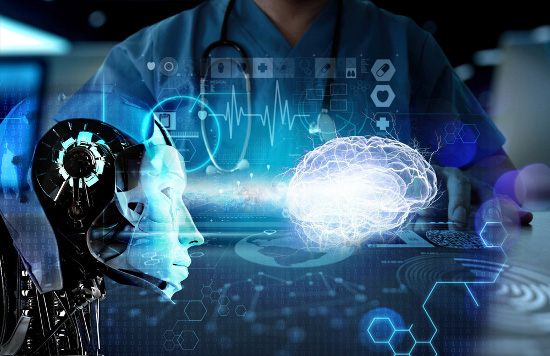Machine learning is a hot topic in the world of healthcare. In recent years, machine learning has begun to be use in a variety of different ways, from improving the accuracy of diagnoses to helping to identify potential health risks. In this blog post, we’re going to take a look at how machine learning is changing the world of healthcare. We’ll cover the benefits of machine learning in healthcare, how machine learning is helping to solve some of healthcare’s biggest challenges, and the potential of machine learning in healthcare. We’ll also touch on some of the ethical considerations of using machine learning in healthcare.


The Benefits of Machine Learning in Healthcare
The benefits of healthcare mobile app are vast and varied. ML can help doctors make better diagnoses, identify new treatments and cures, and improve the accuracy of medical predictions. It can also speed up the process of getting new drugs to market. In addition, ML has the potential to reduce costs for healthcare providers by automating processes that are currently conducted manually.
Machine learning has the potential to improve the quality of care for patients by automating processes that are currently conducted manually. For instance, it can help doctors make better diagnoses and quickly find new treatments and cures for diseases. Additionally, ML can help physicians predict which patients will respond best to a particular treatment. This information can then be use to allocate resources more efficiently.
ML also has the potential to save healthcare providers money in a variety of ways. By doing so, healthcare providers can reduce costs associated with staffing and maintenance requirements. In addition, ML has the ability to identify patterns in large datasets that would otherwise be difficult or impossible to detect with manual inspection alone. As a result, this technology could lead to significant savings on research projects related to drug development and medical diagnosis.
How Machine Learning Is Helping To Solve Some Of Healthcare’s Biggest Challenges
Machine learning is helping to solve some of healthcare’s biggest challenges. For example, it is being use to diagnose diseases more accurately and efficiently. This can save both time and money, as it can help to reduce the number of unnecessary tests and treatments that are carried out. Additionally, machine learning is also helping to improve our understanding of the human body.
This is a hugely important area of research, as it can help to save countless lives. For example, if we could detect cancer early on, then it would be much more difficult for the disease to spread and destroy the patient’s body. In fact, according to some estimates, machine learning could play a role in preventing around 50% of all deaths in the future. This is thanks to its ability to provide accurate and timely information about disease trends.
Of course, there are still some challenges that need to be overcome before machine learning can be fully effective. For example, it needs access to vast amounts of data in order to learn properly. However, this is something that is being addressed by various organisations across the world. And with each new advance made in this field, we can look forward to a future where healthcare is improved dramatically overall.
The Potential of Machine Learning In Healthcare
In healthcare, machine learning has the potential to help identify previously undetected patterns in data. This can have a number of benefits, such as improving the accuracy of diagnosis and treatment. Additionally, machine learning can automate and improve tasks that are currently performed by human experts. As a result, this can reduce costs and make healthcare more efficient.
Machine learning also has the potential to radically transform healthcare by making it more predictive, preventative, personalized, and participatory. For example, ML could be use to predict which patients are likely to experience adverse side effects from a particular medication. It could also be use to recommend new treatments or therapies before they are needed. In addition, ML could help patients take control of their own health data so that it is more easily accessible and usable.
As ML continues to develop, it is likely that we will see even more dramatic changes in healthcare. For example, it is possible that ML could eventually be use to generate new treatments on its own. Alternatively, it could be use to improve the accuracy of predictions made using other forms of AI. Either way, the potential for ML in healthcare is broad and exciting.
How Machine Learning Is Being Used In Healthcare Today
Machine learning is being use in healthcare today to develop new drugs and treatments. This is done by training algorithms on large data sets to identify patterns that may lead to the discovery of new drugs or treatments. Additionally, ML is being use to diagnose diseases. This involves training algorithms on medical images or other data sets to identify signs of disease, and then using this information to create treatment plans or diagnoses.
ML is also being use to personalize treatment plans for patients. This involves using machine learning algorithms to determine which patients will benefit from a particular type of treatment, and then designing a personalized treatment plan for these patients. In addition, ML can be use to predict epidemics. This involves predicting how diseases will spread in a population, and then using this information to create prevention strategies or warn people about upcoming outbreaks.
Machine learning has had a profound impact on healthcare. It is being use to develop new drugs and treatments, to diagnose diseases, to personalize treatment plans for patients, and to predict epidemics. ML is also being use in other fields, such as finance and marketing. This is because it can help us make predictions about how people will behave or what they will buy. ML is becoming an important part of our lives, and it will continue to have a major impact on healthcare in the future.
The Future Of Machine Learning In Healthcare
The future of machine learning in healthcare is changing rapidly and has the potential to improve the way we diagnosis and treat diseases. ML is being use to help us better understand how diseases develop, as well as to predict epidemics. This information can then be use to create more effective treatments and preventative measures. ML can also help us to improve patient care by automating decision-making processes, or by providing insights that were not previously available. In short, ML is having a profound impact on the way we practice medicine – it’s time you knew about it!
The Machine learning Training in Hyderabad course offered by Analytics path will help you become qualified for an expert role in this area.
One of the key areas where ML is being use is in the diagnosis and treatment of diseases. Machine learning algorithms are being applied to large data sets in order to identify patterns that may not be apparent to human eyes. For example, this technology can be used to help us understand how diseases develop over time, or to predict epidemics. This information can then be used to create more effective treatments and preventative measures.
In addition, machine learning has been actively applied in the area of decision-making. This technology can automate certain processes, such as triaging patients or prescribing medications. By automating these tasks, we can free up doctors’ time for more complex work. Furthermore, ML has also been employed for insights that were previously unavailable. For example, it has been able to provide solutions for problems with big datasets or unstructured data formats. As a result of all this innovation, the future looks bright for healthcare providers who are using machine learning!
The Ethical Considerations of Using Machine Learning In Healthcare
There are a number of ethical considerations that need to be considered when using machine learning in healthcare. For example, it is important to consider the privacy and data protection implications of using this technology. Additionally, it is important to consider the potential side effects of using this technology on patients. It is also important to consider the ethical implications of utilising ML in healthcare.
Some potential benefits of using ML in healthcare include improved accuracy and efficiency in medical procedures, as well as reduced costs associated with these procedures. Additionally, ML can help to identify new patterns or trends that may not have been evident before. This could lead to more effective treatments for patients suffering from illnesses or diseases.
However, there are also risks associated with using Artificial intelligence in healthcare. For example, there is a risk that the technology could be use inaccurately or inappropriately – potentially harming patients in the process. Additionally, there is also a risk that data collected through machine learning could be use for malicious purposes – such as marketing schemes aimed at exploiting patient data for financial gain.
The Impact Of Machine Learning On The Healthcare Workforce
The healthcare landscape is changing thanks to the impact of ML. Machine learning is making it easier for providers to diagnose and treat conditions, as well as identify new potential treatments and therapies. As a result, the healthcare workforce is being affected in different ways. For example, doctors and nurses are likely to see their jobs replaced by machines in the next 10-20 years. This change will also impact administrative staff and support workers, who will need to learn new skills in order to keep up with the changes.
One way in which the healthcare workforce will be affected is through the acquisition of new skills. As machines become more sophisticated, many positions within the healthcare sector will require employees to have a high level of knowledge in ML and data analysis.
Similarly, changes in technology are also likely to impact how patients are treated. This means that clinicians no longer need to spend time interpreting these images themselves. Instead, AI can help make interpretations automatically. This could lead to significant reductions in waiting times for patients who require specialist care. However, it is important not to over-use AI – if it is use incorrectly it could end up causing more harm than good.
As machine learning becomes increasingly sophisticated, there is a growing need for staff with the right skillset in order to keep up with the changing landscape. Training programmes and alterations to workplace policies will be necessary in order to accommodate this change.
Case Studies: How Machine Learning Is Benefiting Patients
Machine learning is helping doctors diagnose diseases sooner. By using ML, doctors are able to make more accurate diagnoses and provide treatments that are more tailored to the individual patient. This can improve the quality of care for patients, as well as speed up the process of diagnosing and treating diseases.
ML is also being use to develop new treatments for diseases. For example, it is being use to create algorithms that help identify which patients will respond best to a particular type of treatment. Additionally, ML is helping to develop new drugs and vaccines. This can improve the effectiveness of these treatments, as well as reduce the number of side-effects that occur during treatment.
Last but not least, machine learning is also being use to personalize treatments for patients. For example, it can be use to adjust doses or schedules according to a patient’s specific needs. This can ensure that each patient receives the most effective treatment possible without any unpleasant side-effects.
In Conclusion
This 360postings is likely to give you a clear idea about the Machine learning industry
Machine learning is changing the world of healthcare. It is being use to help us better understand how diseases develop, as well as to predict epidemics. This information can then be use to create more effective treatments and preventative measures. ML can also help us to improve patient care by automating decision-making processes, or by providing insights that were not previously available.
The potential for ML in healthcare is vast. In order to realize this potential, we need to continue research in this field and work towards overcoming the challenges that remain. We also need to ensure that ML is ethically sound and does not unfairly disadvantage any group of people. With these considerations in mind, we can look forward to a future where machine learning transforms healthcare for the betterment of all.
















